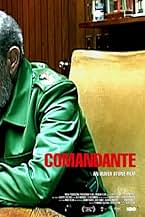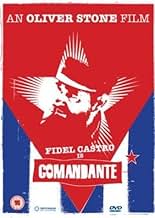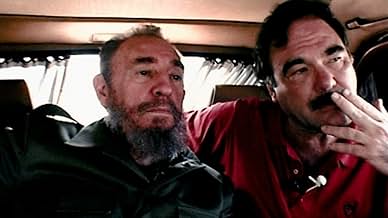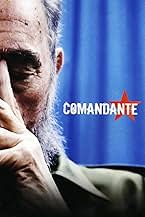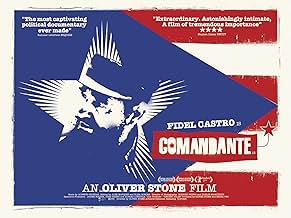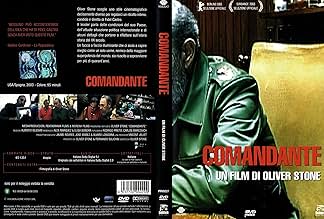Comandante
- 2003
- Tous publics
- 1h 39min
NOTE IMDb
6,9/10
4 k
MA NOTE
Ajouter une intrigue dans votre langueDocumentary on the director's meeting with Castro.Documentary on the director's meeting with Castro.Documentary on the director's meeting with Castro.
Ernesto 'Che' Guevara
- Self
- (images d'archives)
John F. Kennedy
- Self
- (images d'archives)
Richard Nixon
- Self
- (images d'archives)
Janet Reno
- Self
- (images d'archives)
Jaume Roures
- Self
- (non crédité)
Santiago Segura
- Self
- (non crédité)
Avis à la une
I just saw Comandante on Greek public television, in its entirety and uninterrupted and was immediately drawn to it.
Whether one agrees with Cuba's political system or not, is not the issue here. What Oliver Stone has achieved is what no journalist or historian has ever come close to. He brings himself and his crew right up close to the aged leader and confronts him relentlessly with questions from the mundane to the esoteric and from the political to the personal. Ideas about the past and the future, about dreams, art, democracy, colonialism, family, religion, women's rights, education, love etc are all exposed here, bringing out an intimate portrait. The questions are often uncomfortable as when Stone asks Castro about his ex wives in front of his wife, or when his claims about policing in Cuba are denied by one of Stone's crew members. Yet Castro even at this age, is sharp, humorous and poetic in a way that reveals the intellectual behind the politician.
It is also a travel documentary of Havana where Fidel Castro is Stone's guide and walks him through the city's monuments and cafés, sits next to him at the back seat of his car, eats and drinks with him and we get a sense that he knows what is happening in Havana's every alley.
One thing is for sure: no other country leader would ever allow himself the closeness Castro offers to Stone and expose his feelings and doubts with such spontaneity.
Stone turns a formal encounter into a family visit and brings the audience to meet an iconic political figure and spend a couple of intimate hours with him.
A work that leaves you thinking for a long while.
Whether one agrees with Cuba's political system or not, is not the issue here. What Oliver Stone has achieved is what no journalist or historian has ever come close to. He brings himself and his crew right up close to the aged leader and confronts him relentlessly with questions from the mundane to the esoteric and from the political to the personal. Ideas about the past and the future, about dreams, art, democracy, colonialism, family, religion, women's rights, education, love etc are all exposed here, bringing out an intimate portrait. The questions are often uncomfortable as when Stone asks Castro about his ex wives in front of his wife, or when his claims about policing in Cuba are denied by one of Stone's crew members. Yet Castro even at this age, is sharp, humorous and poetic in a way that reveals the intellectual behind the politician.
It is also a travel documentary of Havana where Fidel Castro is Stone's guide and walks him through the city's monuments and cafés, sits next to him at the back seat of his car, eats and drinks with him and we get a sense that he knows what is happening in Havana's every alley.
One thing is for sure: no other country leader would ever allow himself the closeness Castro offers to Stone and expose his feelings and doubts with such spontaneity.
Stone turns a formal encounter into a family visit and brings the audience to meet an iconic political figure and spend a couple of intimate hours with him.
A work that leaves you thinking for a long while.
This film is an interesting document only because it provides a glimpse into the leader's more trivial pursuits. ("I've seen TITANIC on video. It needs a big screen" says Castro.) It fails miserably where Oliver Stones asks tough questions yet fails to pursue the partial answers, or at times total avoidance of the question altogether.
Some of the issues talked around are surprising (The CIA role in Angola, Cuba's AIDS quarantine camps, the role of Miami exiles, 1980's prison camps for gays) while others are just bizarre (the lack of multiple parties in Cuban elections, his son's US education, Nicaragua and Venezuela).
The documentary instead puts us through yet another series of Che Guevara tales told less than honestly by Fidel. The frequent shots of Eva Peron suggest that Fidel Castro's revolution is not a failed relic but rather the dreamy illusions of yet another misguided albeit glamorous femme fatale.
Some of the issues talked around are surprising (The CIA role in Angola, Cuba's AIDS quarantine camps, the role of Miami exiles, 1980's prison camps for gays) while others are just bizarre (the lack of multiple parties in Cuban elections, his son's US education, Nicaragua and Venezuela).
The documentary instead puts us through yet another series of Che Guevara tales told less than honestly by Fidel. The frequent shots of Eva Peron suggest that Fidel Castro's revolution is not a failed relic but rather the dreamy illusions of yet another misguided albeit glamorous femme fatale.
It warms my heart to discover that there are human beings in charge on some parts of the planet. Stone's documentary, although annoyingly pop videoish in places shows us the human side of Castro. I do not care where your politics lie, who can argue with a policy of housing, education and health care for all. Castro is portrayed by the US in an uncomplimentary light, well its good to know not all Americans feel that he is a ruthless dictator.
I want to know what Bush would say about crime, prostitution, religion, war and torture. He would not only deny it he would outright claim his country to be perfect. well nobody or country is perfect, and a least Castro can admit this. I just think of all he has achieved with one hand tied behind his back, it put's the West to shame, if his democracy is different to our's, who are we to say he is wrong!
I want to know what Bush would say about crime, prostitution, religion, war and torture. He would not only deny it he would outright claim his country to be perfect. well nobody or country is perfect, and a least Castro can admit this. I just think of all he has achieved with one hand tied behind his back, it put's the West to shame, if his democracy is different to our's, who are we to say he is wrong!
Like one of the previous reviewers I also recently saw 'Comandante' on Canadian cable outlet CBC Newsworld...
Nothing earth shattering to report here: to the extent that I'm even having trouble labeling the movie interesting, which is quite a surprise considering the array of historically significant topics and events it touches on - though I must say seeing Fidel sport a black pair of Nikes as he paces around his office (apparently on regular basis to get exercise) might alone be worth the price of admission.
Observant audience members will also notice he grows his fingernails long for no apparent reason, which I guess is the kind of vanity one engages in after ruling a nation with an iron fist for 40+ years.
Those expecting Bill O'Reilly-type barrage of aggressive queries thrown Fidel's way will be more than disappointed. If you've ever wondered what it would be like if Robin Leech and pre-'View' Barbara Walters morphed into single person who then got an assignment to interview a sitting president.... well, you may have gotten your answer in Stone's laid back style.
Though it's clearly not all Oliver's fault, I'm really none the wiser about Fidel after 'Comandante' than I was, say, about JaRule following his appearance on MTV's 'Cribs'.
The reasons why this 2-colourful-guy chitchat ended up on TV instead of being released in the theaters are very much political and duly reflect America's current paranoid social climate.
However, in the end the movie actually profited from such skullduggery since even on the small screen I found it only marginally arousing. Having to pay $12 ticket for this would really be a bummer.
Nothing earth shattering to report here: to the extent that I'm even having trouble labeling the movie interesting, which is quite a surprise considering the array of historically significant topics and events it touches on - though I must say seeing Fidel sport a black pair of Nikes as he paces around his office (apparently on regular basis to get exercise) might alone be worth the price of admission.
Observant audience members will also notice he grows his fingernails long for no apparent reason, which I guess is the kind of vanity one engages in after ruling a nation with an iron fist for 40+ years.
Those expecting Bill O'Reilly-type barrage of aggressive queries thrown Fidel's way will be more than disappointed. If you've ever wondered what it would be like if Robin Leech and pre-'View' Barbara Walters morphed into single person who then got an assignment to interview a sitting president.... well, you may have gotten your answer in Stone's laid back style.
Though it's clearly not all Oliver's fault, I'm really none the wiser about Fidel after 'Comandante' than I was, say, about JaRule following his appearance on MTV's 'Cribs'.
The reasons why this 2-colourful-guy chitchat ended up on TV instead of being released in the theaters are very much political and duly reflect America's current paranoid social climate.
However, in the end the movie actually profited from such skullduggery since even on the small screen I found it only marginally arousing. Having to pay $12 ticket for this would really be a bummer.
In the American corporate media, Castro is always played up as some kind of monster. The corporate media (and a host of draconian laws help) prevent us from hearing what he has to say. This documentary is excellent if anything but to give us a chance to hear what Castro has to say.
This was geared for an American audience, most of whom are probably ignorant about who Arbenz was, or Allende, and who probably never heard of the MPLA. It's mentioned at some point in the film that all the bad things that American big business and the CIA do around the world is known around the world - known everywhere except by US citizens. This is true, then again, the US is one of the few industrialized countries who for most of the 20th into the 21st century had almost all of it's radio and television channels, as well as newspaper printing presses controlled by corporations. It's unfortunate that Stone thus feels he has to ask about Cubans in Vietnam and this sort of nonsense which takes up time that could have been used asking more about Castro's perspective of what is going on in Latin America.
This was geared for an American audience, most of whom are probably ignorant about who Arbenz was, or Allende, and who probably never heard of the MPLA. It's mentioned at some point in the film that all the bad things that American big business and the CIA do around the world is known around the world - known everywhere except by US citizens. This is true, then again, the US is one of the few industrialized countries who for most of the 20th into the 21st century had almost all of it's radio and television channels, as well as newspaper printing presses controlled by corporations. It's unfortunate that Stone thus feels he has to ask about Cubans in Vietnam and this sort of nonsense which takes up time that could have been used asking more about Castro's perspective of what is going on in Latin America.
Le saviez-vous
- AnecdotesAt the beginning of the movie, when Stone and Castro are strolling through the corridors, you see Santiago Segura, dressed in white, standing in front of a group of people.
- ConnexionsFeatures Vatel (2000)
- Bandes originales11.11
Written and Performed by Paul Kelly
Meilleurs choix
Connectez-vous pour évaluer et suivre la liste de favoris afin de recevoir des recommandations personnalisées
- How long is Comandante?Alimenté par Alexa
Détails
Box-office
- Montant brut mondial
- 135 633 $US
- Durée1 heure 39 minutes
- Couleur
- Mixage
Contribuer à cette page
Suggérer une modification ou ajouter du contenu manquant


